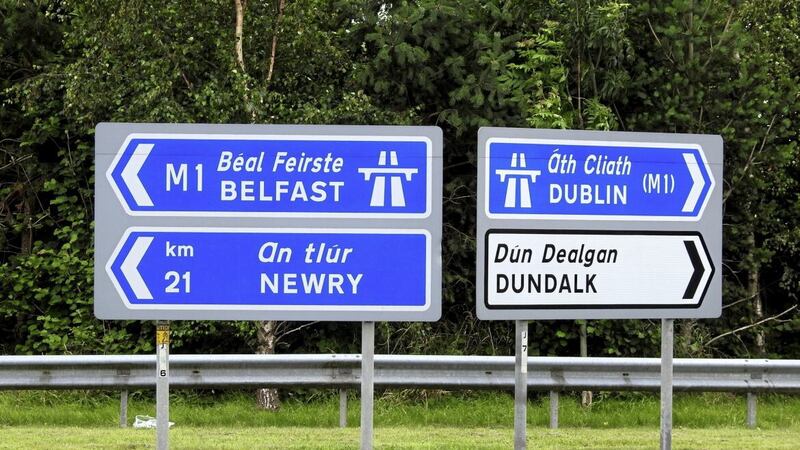Would we really be better off in a united Ireland? The question was posed on the radio on Monday morning with the comment that it would be good to have a simple, side-by-side comparison. There are probably a lot of people who might like to see the same, says I to myself.
This column comes with a caveat though. I’m not an economist or a statistician. I took some key life events and compared them using publicly-available information on a number of websites north and south and set them out here as of today’s date.
The first social welfare benefit any of us are entitled to is child benefit. Both benefits systems pay to age 16, or age 18 if the young person is in full-time education.
In the south it’s paid at a rate of €140 per child per month (or €210 per twin and €280 per triplet or quad). It’s a universal benefit, non means-tested and does not affect any other benefits. There is also a one-off €100 cost-of-living payment being made this month. A family with two children will receive €3,560 (£3,085) this year.
In the north of Ireland, the rate is £24 per week for the first child and £15.90 for the second or subsequent child. A family of two children would receive £2,078.80 this year. Child benefit is taken into consideration when calculating social welfare entitlements and is also reduced if you earn over £50,000.
These children go off to school and their education in the north is free up to the time they leave secondary school. In the south of Ireland, children pay for school books at secondary level. The Barnardos Ireland 2022 Back to School survey put the average cost of school books at €206 per year per child.
If your little darlings are heading off to university in September, they will be paying £4,710 tuition fees for most undergraduate degrees in the University of Ulster or Queen's. If they go to any public university in the Republic of Ireland, they will have their fees paid and will have to pay a student contribution charge of €3,000 (£2,600). This charge applies to Irish, British and EU citizens alike.
Going into the workplace, armed with their fresh degree this year, your newly-qualified teacher can expect a basic starting salary of £24,137 according to the NASUWT. Point 1 of the pay scale in the south is €38,637 (£33,484).
As a nurse they would be starting on £20,270 in Daisy Hill or €33,193 (£28,767) in Drogheda. Civil service graduate entry level jobs for an executive officer at the entry point of the pay scale are £26,569 in Derry and €33,149 (£28,726) in Letterkenny.
Assuming they’re single with no dependents when they start out in their career, they will pay 20 per cent tax in both jurisdictions after personal allowances are taken into account.
Buying a house is the biggest investment most of us will make in our lives. The average house price in the north in the first quarter of 2023 was £197,800. The median property price in the south of Ireland was €310,000 (£268,610) in the 12 months to February 2023. Bank of Ireland’s standard variable rate of interest as of today is 7.59 per cent in the north and 4.5 per cent in the south.
What happens if you get sick? If you are one of the 30.8 per cent of people in the south of Ireland who has a medical card due to poor health or low income, you won’t pay to see your doctor and prescriptions will cost €1.50 per item up to a maximum of €15 (£13) a month. This is capped at €10 if you’re over 70 years old. Otherwise, you will pay €50 (343.27) to see your GP, although free for under 7s. Under the drugs payment scheme, prescription costs are a maximum of €80 (£69). There is no charge for consultant or hospital care as a public patient.
If you were unable to work in the long term due to illness or disability, you are eligible to apply for disability allowance in the south of €220 (£190) per week or Personal Independence Payment of £95 per week in the north. You may be eligible for extra benefits or allowances on top of these.
If you find yourself out of work you may qualify for “new-style Jobseekers allowance” of £84.80 a week in the north or old-fashioned Jobseekers allowance in the south of €220 (£190). Again, you may be eligible for other benefits under both schemes.
And if you make it through that and get to retirement, good luck navigating the pension system in either jurisdiction. But assuming you paid your full stamp for at least 30 years and you turn 66 this year, you’ll get £203.85 per week in the north and €265.30 (£229.52) in the south. Based on average life expectancy figures, you’d be drawing the pension for an extra two years and 10 months in the south.
The United Nations Human Development report 2021-22 ranked the best countries to live in globally based on aggregated scores in areas such as GDP per capita, personal freedom, crime statistics, life expectancy and more. Ireland was ranked number 8, the United Kingdom ranked at number 18.
It’s not utopia and there are improvements to be made without doubt, but based on the basics, it does look like we would, indeed, be better off in a united Ireland.








